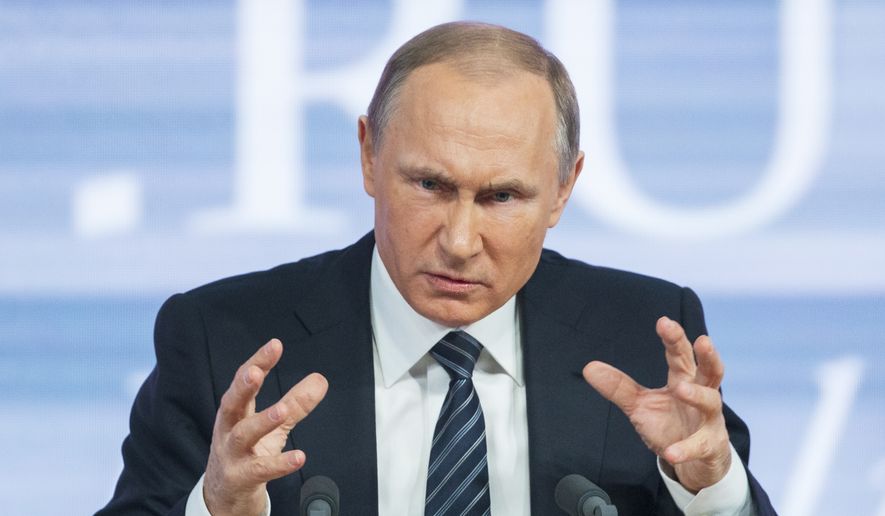ANALYSIS/OPINION:
Turkey, a NATO member, shot down a Russian SU-24 fighter bomber that briefly entered its airspace during attacks on rebels in Syria in late 2015. The deliberate Turkish action was meant to push back against an aggressive Russia that had repeatedly ignored Turkish warnings, showing a complete disregard for the sovereignty of a NATO country.
The shoot-down was a slap in the face for Russian President Vladimir Putin, who had grown accustomed to getting his way and behaving aggressively, with American and European weakness on full display.
The Kremlin’s actions in Crimea and Ukraine’s Donbass region had gone unchallenged. All American armor had been withdrawn from Europe. American and NATO military power were in decline. It seemed there was no one to stop the Kremlin from doing whatever it wanted to do. President Obama backed down from his “red lines” in Syria. If the Russians wanted to violate Turkish airspace from time to time, who was going to stop them?
Airspace violations were not the only thing bothering Turkish President Recep Tayyip Erdogan. Sunni Arab Turkey had long been at odds with the Syrian regime and backed the opposition to President Bashar Assad’s government in hopes of removing the Shiite threat from its doorstep. Then Russia dramatically reversed the facts on the ground with the landing of its expeditionary force to bolster its ally Mr. Assad. The opposition was now on the run.
The Turkish shot that downed the Russian jet took the Kremlin by surprise. Mr. Putin angrily called it a stab in the back. Russia and Turkey had deep ties economically, primarily in tourism and energy. Moscow demanded an apology, and Ankara refused. Mr. Putin quickly imposed sanctions on Turkish food imports and forbade Russians from visiting one of their favorite tourist destinations.
And Mr. Putin had other cards up his sleeve.
An independent Kurdish state on its southern border has long been a Turkish nightmare, given the government’s long fight with the PKK and other violent elements of Turkey’s own Kurdish minority. Istanbul considers the PKK a terrorist organization, and a bloody, low-intensity conflict simmered on the border with Iraq and Syria for decades.
Russia obviously knew this and set to supporting Kurdish units operating in the Turkey-Syria border region. It seems the prospect of a Kurdish state emerging in this semi-autonomous area was too much for Ankara to take.
This week, Turkey blinked. Mr. Erdogan issued a letter of regret to the Kremlin over the incident. “We never had the desire or deliberate intention of shooting down the plane,” he stated. Expressing “sympathy and profound condolences to the family of the Russian pilot,” Mr. Erdogan asked Russia to “excuse us” — at least according to the account in The Moscow Times.
Although Turkey is now attempting to back away from the letter in an attempt to save face, this development marks a total capitulation. The fact that Mr. Erdogan sent his letter right after Britain’s vote to leave the European Union is no accident.
Turkey, which has long been blocked from joining the economic union, can feel the EU’s power shrinking. Mr. Putin has long sought to weaken Western institutions and sow discord among the ranks. Perhaps Turkey feels the pressure from the Iranian, Syrian and Russian alliance to the south as well.
In any event, the episode exposes the weakness on NATO’s southern flank in the face of a resurgent Russia and cements Mr. Putin’s image as the strongman of Europe. The Kremlin has shown it will not blink first and is ready to bear any hardship until the West comes around. This is happening with the sanctions on Russia for Ukraine as well. Russia is just biding its time and recently extended the ban on European food imports, increasingly confident that Europe will blink as well eventually.
The West needs to realize that in a waiting game, the Russians will always win. It’s in their genes. The only way to change Moscow’s behavior is with the threat and the will to use force. As distasteful as preparing for war is for progressives and liberals, it is the only way to prevent one, especially when dealing with Russia. We have learned this throughout history, or at least some of us have. The left refuses to confront this reality.
• L. Todd Wood is a former special operations helicopter pilot and Wall Street debt trader, and has contributed to Fox Business, The Moscow Times, National Review, the New York Post and many other publications. He can be reached through his website, LToddWood.com.
• L. Todd Wood can be reached at ltwood@123washingtontimes.com.




Please read our comment policy before commenting.